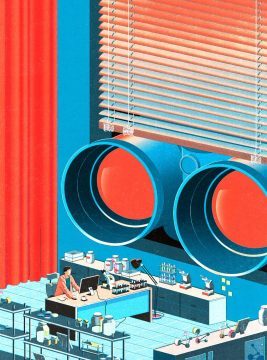Peter Waldman in Bloomberg News:
 The dossier on cancer researcher Xifeng Wu was thick with intrigue, if hardly the stuff of a spy thriller. It contained findings that she’d improperly shared confidential information and accepted a half-dozen advisory roles at medical institutions in China. She might have weathered those allegations, but for a larger aspersion that was far more problematic: She was branded an oncological double agent. In recent decades, cancer research has become increasingly globalized, with scientists around the world pooling data and ideas to jointly study a disease that kills almost 10 million people a year. International collaborations are an intrinsic part of the U.S. National Cancer Institute’s Moonshot program, the government’s $1 billion blitz to double the pace of treatment discoveries by 2022. One of the program’s tag lines: “Cancer knows no borders.”
The dossier on cancer researcher Xifeng Wu was thick with intrigue, if hardly the stuff of a spy thriller. It contained findings that she’d improperly shared confidential information and accepted a half-dozen advisory roles at medical institutions in China. She might have weathered those allegations, but for a larger aspersion that was far more problematic: She was branded an oncological double agent. In recent decades, cancer research has become increasingly globalized, with scientists around the world pooling data and ideas to jointly study a disease that kills almost 10 million people a year. International collaborations are an intrinsic part of the U.S. National Cancer Institute’s Moonshot program, the government’s $1 billion blitz to double the pace of treatment discoveries by 2022. One of the program’s tag lines: “Cancer knows no borders.”
Except, it turns out, the borders around China. In January, Wu, an award-winning epidemiologist and naturalized American citizen, quietly stepped down as director of the Center for Public Health and Translational Genomics at the University of Texas MD Anderson Cancer Center after a three-month investigation into her professional ties in China. Her resignation, and the departures in recent months of three other top Chinese American scientists from Houston-based MD Anderson, stem from a Trump administration drive to counter Chinese influence at U.S. research institutions. The aim is to stanch China’s well-documented and costly theft of U.S. innovation and know-how. The collateral effect, however, is to stymie basic science, the foundational research that underlies new medical treatments. Everything is commodified in the economic cold war with China, including the struggle to find a cure for cancer.
Behind the investigation that led to Wu’s exit—and other such probes across the country—is the National Institutes of Health, in coordination with the FBI. “Even something that is in the fundamental research space, that’s absolutely not classified, has an intrinsic value,” says Lawrence Tabak, principal deputy director of the NIH, explaining his approach. “This pre-patented material is the antecedent to creating intellectual property. In essence, what you’re doing is stealing other people’s ideas.”
More here.
